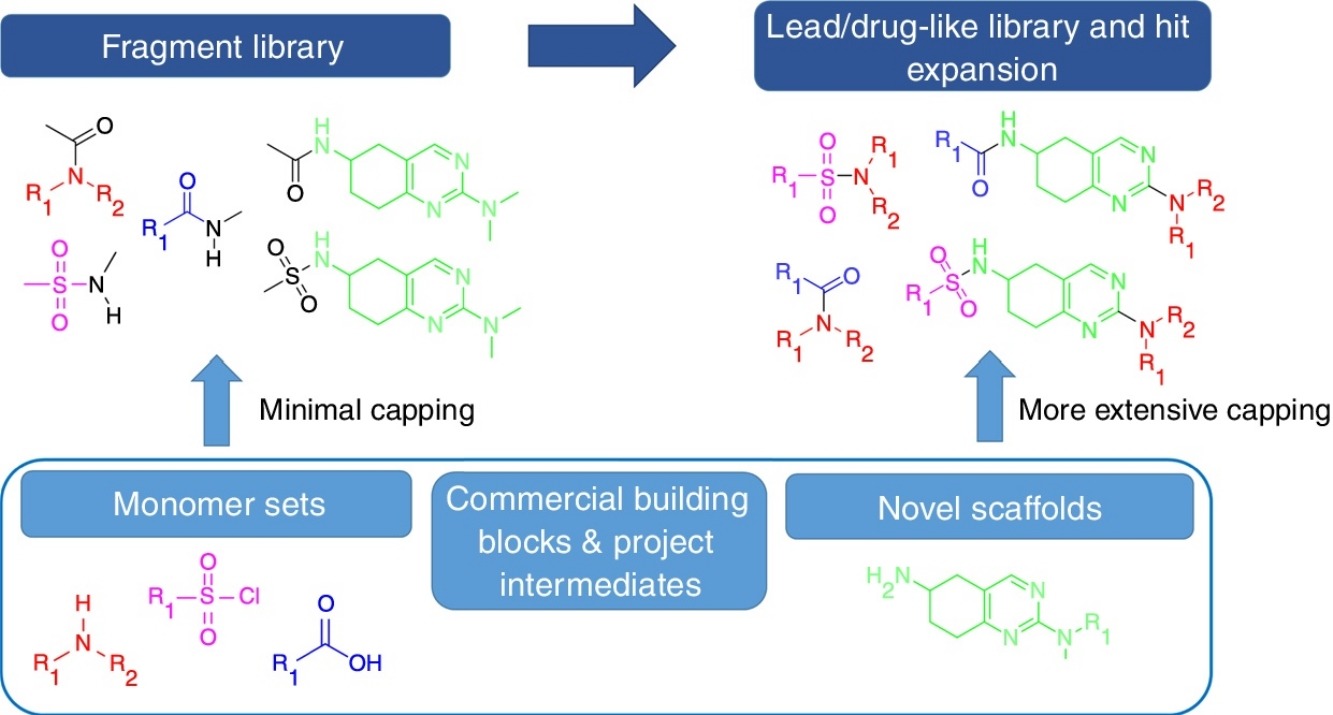Fragment Libraries
Compounds in fragment libraries are general with smaller molecular weight and higher solubility, making the optimization of structure easier. Compared with high throughput screening requiring a large-scale compound collection, only a few number of fragment molecules enable to form numerous drug structures in the fragment screening campaigns. Fragment library therefore can produces higher ligand efficiency and be used as a powerful tool to provide more chances for growing potential hits.
 Fig.1 Strategies for compiling a fragment library. (Ray, P. C.; et al. 2017)
Fig.1 Strategies for compiling a fragment library. (Ray, P. C.; et al. 2017)Our Capabilities of Fragment Libraries
Our fragment libraries are designed and developed on the basis of rules-of-three. We offer a variety of high-quality fragment libraries to meet different needs of our customers in an all-round way.
Lead-like Fragment Libraries
We are expertise in selecting and designing scaffolds and enable to synthesize some small series of lead-like fragments around them. Undesired fragments are eliminated during the synthesis possess. The lead-like fragment libraries at BOC Sciences contain more than 10,000 compounds with good water solubility and lead-like properties, offering good start point for the subsequent fragment growth.
High Solubility Fragment Library
The fragment molecules with higher solubility is easier to optimize their structure and the potential for druggability is higher. Our high solubility fragment library consisting of more than 2,000 fragments is an extremely useful screening tool for fragment-base drug discovery. All the fragments in this unique library have great solubility (guaranteed solubility in DMSO and PBS buffer: DMSO (200 mM), PBS (1 mM)) and own excellent medicinal properties, which is convenient for subsequent structural optimization.
Drug-fragment Library
There is a certain correlation between the structure of fragments and the pharmacological properties of the drug, different drug therefore may share the same fragments. We have built a drug-fragment library of more than 1,000 fragment molecules through screening over thousands of listed drugs and clinical-stage drugs, making it easier to find active lead compounds with ideal drug properties.
3D-Fragment Library
Drugs are likely to be more selective if they are presented as three-dimension. BOC Sciences has established a library in which the compounds have well-developed 3D-shapes, and these property of scaffold/molecule saturation can provide multiple benefits including access to greater chemical space, improved physicochemical parameters (logP; PSA; water solubility), more opportunity for further scaffold modification, better affinity to target proteins and greater selectivity.
Our Advantages of Fragment Libraries
- Quality assurance: We perform a set of methods such as NMR, HPLC/LC-MS and other testing technology to ensure that all the fragment molecules in our compound libraries are correct and high purity.
- Applicable for various methods: Our fragment libraries are suitable for SPR, nuclear magnetic, X-ray monocrystalline diffraction and other detection techniques.
Reference
- Ray, P. C.; et al. Fragment library design, synthesis and expansion: nurturing a synthesis and training platform. Drug Discovery Today. 2017, 22(1): 43-56.
※ It should be noted that our service is only used for research.

One-stop
Drug Discovery Services
- Experienced and qualified scientists functioning as project managers or study director
- Independent quality unit assuring regulatory compliance
- Methods validated per ICH GLP/GMP guidelines
- Rigorous sample tracking and handling procedures to prevent mistakes
- Controlled laboratory environment to prevent a whole new level of success
Online Inquiry

